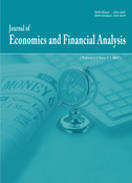URI: https://ojs.tripaledu.com/jefa/article/view/34/28
A Study on Regime Type and Globalization in Simultaneous Equation Framework
DOI: http://dx.doi.org/10.1991/jefa.v2i1.a14
Abstract
Keywords
JEL Classification
References
Acemoglu, D., and Robinson, J.A. (2006a). Economic Backwardness in Political Perspective. American Political Science Review, 100(1), 115-131.
Acemoglu, D., and Robinson, J.A. (2006b). Economic Origins of Dictatorship and Democracy. Cambridge, Mass: Cambridge University Press.
Dreher, A. (2006). Does Globalization Affect Growth? Evidence from a new Index of Globalization. Applied Economics, 38(10), 1091-1110.
Dreher, A., Gaston, N., and Martens, P. (2008). Measuring Globalisation: Gauging its Consequences. New York: Springer.
Eichengreen, B., and Leblang, D. (2006). Democracy and Globalization. NBER Working Paper, No. 12450. Cambridge, Mass: National Bureau of Economic Research.
Haffoudhi, H., and Bellakhal, R. (2016). Threshold Effect of Globalization on Democracy: The Role of Demography. SSRN: https://ssrn.com/abstract=2906308.
Hayek, F.A. (1960). The Constitution of Liberty. Chicago: University of Chicago Press.
Keynes, J.M. (1921). A Treatise on Probability. London: Macmillan.
Kollias, C., and Paleologou, S.M. (2016). Globalization and Democracy: A Disaggregated Analysis by Income Group. Global Economy Journal, 16(2), 213–228.
Li, Q., and Reuveny, R. (2003). Economic Globalization and Democracy: An Empirical Analysis. British Journal of Political Science, 33(1), 29-54.
Lipovetsky, S. (2006). Entropy Criterion in Logistic Regression and Shapley Value of Predictors. Journal of Modern Applied Statistical Methods, 5(1), 95-106.
Lipset, S.M. (1959). Some Social Requisites of Democracy: Economic Development and Political Legitimacy. American Political Science Review, 53(1), 69-105.
Milner, H.V. and Mukherjee, B. (2009). Democratization and Economic Globalization. Annual Review Political Science, 12, 163–81.
Mishra, S.K. (2013). Global Optimization of Some Difficult Benchmark Functions by Host-Parasite Coevolutionary Algorithm. Economics Bulletin, 33(1), 1-18.
Mishra, S.K. (2016). Shapley Value Regression and the Resolution of Multicollinearity. Journal of Economics Bibliography, 3(3), 498-515.
Mishra, S.K. (2017). Almost Equi-Marginal Principle based Composite Index of Globalization: China, India and Pakistan. Journal of Economic and Social Thought, 4(3), 335-351.
Nayyar, D. (1915). Globalization and Democracy. Brazilian Journal of Political Economy, 35 (3), 388-402.
Reiersol, O. (1945). Confluence Analysis by Means of Instrumental Sets of Variables. Arkiv for Mathematic, Astronomi, och Fysik. 32A. Uppsala: Almquist & Wiksells.
Roth, A.E. (1988). Introduction to the Shapley Value. In Roth, A.E. (ed. 1977). The Shapley Value: Essays in Honor of Lloyd S. Shapley. New York: Cambridge Univ. Press.
Rudra, N. (2005). Globalization and the Strengthening of Democracy in the Developing World. American Journal of Political Science, 49(4), 704-730.
Schumpter, J.A. (1950). Capitalism, Socialism and Democracy. New York: Harper & Row.
Schwartzman, K.C. (1998). Globalization and democracy. Annual Review of Sociology, 24(1), 159-81.
Smith, G., and Brainard, W. (1976). The Value of a priori Information in Estimating a Financial Model. Journal of Finance, 31(5), 1299-1322.
Sobhan, R. (2003). Globalization and the Challenge to Democracy. International Journal of Development Issues, 2(2), 1-14.
Stein, A.A. (2016). The Great Trilemma: Are Globalization, Democracy, and Sovereignty Compatible? International Theory, 8(2), 297-340.
Steiner, N.D. (2015). Essays on Globalization and Democracy. D. Phil dissertation, vorgelegt dem Fachbereich 02 – Sozialwissenschaften, Medien und Sport der Johannes Gutenberg Univ., Mainz. https://nilssteiner.com/wp-content/uploads/2017/01/Dissertation_Steiner_Introduction-only.pdf
Turyahikayo, E. (2014). The Impact of Globalization on Domestic Political Structures in Established, Transitional and Non-Democracies. Journal of Good Governance and Sustainable Development in Africa, 2(2), 94-109.

This work is licensed under a Creative Commons Attribution-NonCommercial-NoDerivatives 4.0 International License.


